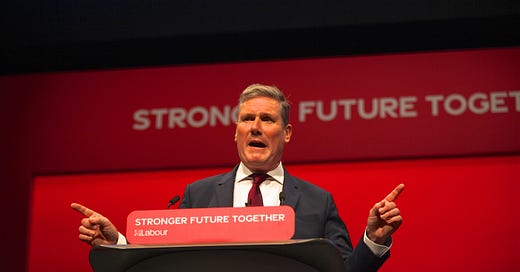In the penultimate season of The West Wing, debate-prep consultant Amy Gardner struggles to coach a talented but inexperienced Texan congressman into finding his “presidential voice”. The politician’s angry campaign chief tells him: “Here’s what Amy won’t tell you about the voice: You have to become president to use it”.
Every time someone complains that an opposition leader lacks charisma or vision, I think of this line. Nothing is more likely to make a visionless and unpopular opposition leader look, swim and quack like a head of state or government than being one. Take Anthony Albanese. Australia’s premier, who now leads his conservative rival by 30 points as "preferred prime minister", was still trailing the widely loathed incumbent Scott Morrison by ten points months before the May 2022 election.
Do you know who else were poorly rated opposition leaders? Mariano Rajoy, Spain’s prime minister from 2011-18, François Hollande, French president from 2012-17, and – the greatest force tranquille of them all – Angela Merkel, Germany’s four-term chancellor who would be her country’s longest-serving government leader if she’d stayed on for another 11 days.
Okay, a bit of charisma and vision can help but they’re unnecessary to the taking of power since the cliché is also true: oppositions don’t win elections; governments lose them. On the rare occasions that oppositions do lose them, it’s often down to a superficially exciting policy offering that politicians lack the skills to defend and that incumbents can caricature and unravel. Without a Frexit platform that frightened older voters, Marine Le Pen could well have won the 2017 French election. At her first federal election in 2005, Merkel threw away a double-digit lead and came within a whisker of defeat for her perceived support for a 25% flat tax. Going back another decade, the British Labour Party’s unprecedented “shadow budget” in 1992 was meant to reassure voters but merely fed the Conservatives’ “tax bombshell” campaign.
Playing defence
The experience of the 1992 campaign is seared in the memory of Labour’s centre-left. After that, vision was confined to the non-specific while potential vulnerabilities – budgetary profligacy, a soft approach to crime, and hostility to the military – were closed off. This is why Sebastian Payne’s recent column (Starmer is credible, but where’s the big idea?) in The Times about Tony Blair’s intellectually ambitious 1997 programme made me laugh.
This has been entertainingly taken apart by David Aaronovitch in his brand-new Notes from the Underground Substack newsletter. “The problem with this is that it is nonsense. Payne was seven at the time of the 1997 election and even allowing for his obvious precocity he doesn’t so much misremember as bear the marks of someone who has sat at a vinous think-tank lunch next to a veteran misrememberer”.
It wasn’t pledges to introduce a minimum wage, a human rights act, and civil partnerships that won the 1997 election for Labour. It was public exhaustion with the Conservatives, trust that the Labour left had been tamed, and – closely linked to that – Labour’s pledge in opposition to leave income-tax rates unchanged and adhere to the incumbent administration’s public-spending totals for its first two years in office.
With the blessing of the many Blairites advising him, Keir Starmer, the fourth elected Labour leader since Blair, is using the same defensive tactics – especially when it comes to Brexit. His position allows significant scope for improving economic and political relations with the EU without providing a soft flank around free movement.
Is it hurting Labour? It could demoralise ardent Remainers enough to cause vote-splitting defections to the Liberal Democrats and Greens but not enough to offset Labour’s huge national lead and its even stronger advantage in many marginal seats. Is the chance of a Rishi Sunak revival and victory “underpriced”, as has been “whispered” to Tory-sympathising commentators (almost certainly by James Forsyth, Sunak’s political secretary and long-time political editor for The Spectator)?
Source: Smarkets betting exchange
At 20%? No, it’s overpriced.







Absolutely. A Savanta poll out this weekend put Labour at 33% to the SNP’s 39% in Westminster voting intentions compared to 19/45 in 2019.
Some Scottish hopes for Labour too possibly. But how many and at what cost?